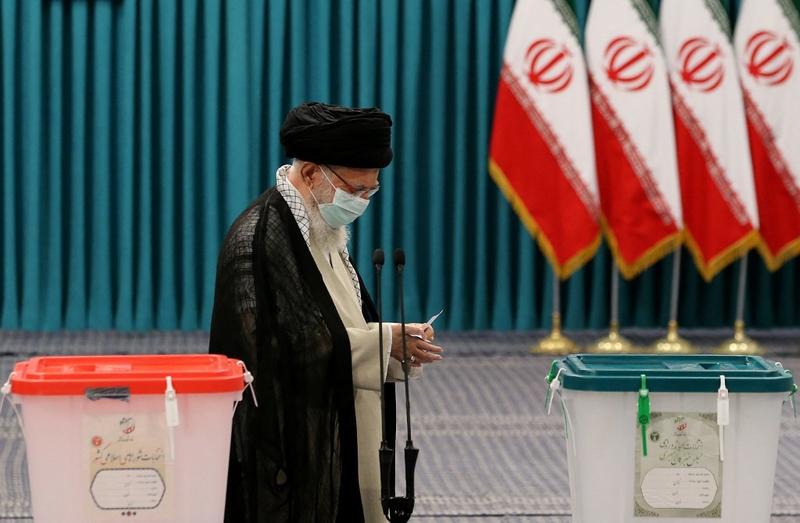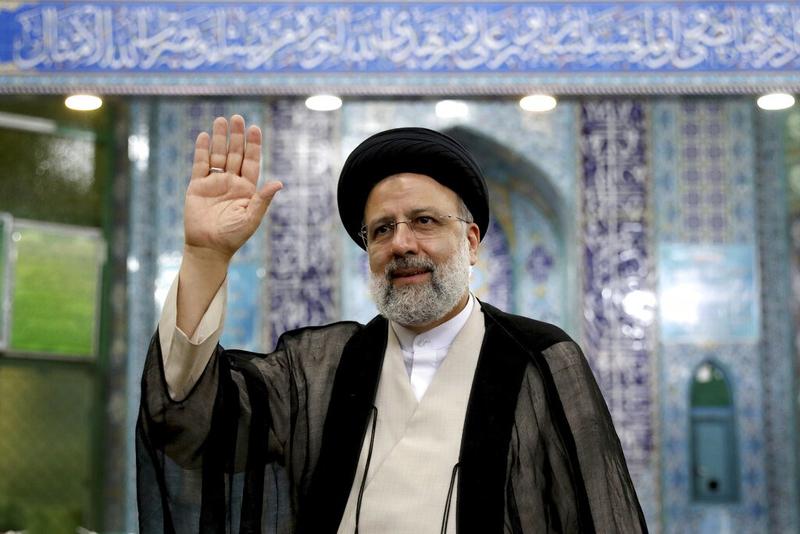 Iran's Supreme Leader Ayatollah Ali Khamenei prepares to cast his ballot on June 18, 2021, on the day of the Islamic republic's presidential election. (ATTA KENARE / AFP)
Iran's Supreme Leader Ayatollah Ali Khamenei prepares to cast his ballot on June 18, 2021, on the day of the Islamic republic's presidential election. (ATTA KENARE / AFP)
DUBAI - Iranians voted on Friday in a contest set to hand the presidency to a hardline judge subject to US sanctions, though many are likely to ignore the ballot amid anger over economic hardship and calls for a boycott by critics of hardline rule.
Senior officials appealed for a large turnout in an election widely seen as a referendum on their handling of mounting economic and social pressures, including rising prices and unemployment and a collapse in the value of its currency.
"I urge everyone with any political view to vote," judiciary head Ebrahim Raisi, the frontrunner in the contest, said after casting his ballot, state media reported.
"Our people's grievances over shortcomings are real, but if it is the reason for not participating, then it is wrong."
More than 59 million Iranians are eligible to vote in Friday's presidential poll
While state television showed long queues at polling stations in several cities, the semi-official news agency Fars reported 14 million or 23 percent of voters had cast ballots by 4:45 pm (1215 GMT), citing its own reporter.
After voting in the capital Tehran, Supreme Leader Ayatollah Ali Khamenei urged Iranians to cast ballots, saying "each vote counts ... come and vote and choose your president".
Raisi, 60, has the backing of security hawks in his bid to succeed Hassan Rouhani, a pragmatist prevented under the constitution from serving a third four-year term in the post, which runs the government day-to-day and reports to the supreme leader.
Supported by the powerful Revolutionary Guards Corps, Raisi, who like his political patron Ayatollah Khamenei is an implacable critic of the West, is under US sanctions.
ALSO READ: Iran says next president will continue talks on nuclear deal
 Ebrahim Raisi, a candidate in Iran's presidential election, waves to the media after casting his vote at a polling station in Tehran, Iran, on June 18, 2021. (EBRAHIM NOROOZI / AP)
Ebrahim Raisi, a candidate in Iran's presidential election, waves to the media after casting his vote at a polling station in Tehran, Iran, on June 18, 2021. (EBRAHIM NOROOZI / AP)
Voters reached by Reuters expressed mixed views.
Vahid, 49, who teaches woodcraft in Tehran, said "I will vote because my Leader (Ayatollah Khemenei) wants me to." He plans to vote for Raisi.
Asked which candidate he preferred, Mohammad, 32, at a polling station in a hamlet in southern Iran, replied: "To be honest none of them, but our representative in parliament says we should vote for Raisi so that everything will improve.”
Boycott
Rights activist Shadi, 32, said she would not vote because none of the candidates "gives us hope".
"My vote is a big NO to the Islamic Republic," said Farzaneh, 58, from the central city of Yazd, referring to the country's system of clerical rule. She said contrary to what state TV reported, "the polling stations are almost empty here".
While hundreds of Iranians have called for an election boycott, the establishment’s religiously devout core supporters are expected to vote for Raisi.
More than 59 million Iranians are eligible to vote. Polls will close at 1930 GMT but can be extended for two hours. The results are expected around midday on Saturday.
 A voter casts her ballot for the presidential election at a polling station in Tehran, Iran, June 18, 2021. (VAHID SALEMI / AP)
A voter casts her ballot for the presidential election at a polling station in Tehran, Iran, June 18, 2021. (VAHID SALEMI / AP)
Demise of the pragmatists
A win for Raisi would confirm the political demise of pragmatist politicians like Rouhani, weakened by the US decision to quit the nuclear deal and reimpose sanctions in a move that stifled rapprochement with the West.
The reimposed curbs slashed oil exports from 2.8 million barrels per day in 2018 to as low as an estimated 200,000 bpd in some months of 2020, although volumes have crept up since then. The rial currency has tumbled 70 percent in value since 2018.
Under pressure over rising inflation and joblessness, at about 39 percent and 11 percent, respectively, the clerical leadership needs a high vote count to boost its legitimacy, damaged after a series of protests against poverty and political curbs since 2017.
The favorite to succeed Hassan Rouhani is hardline Ebrahim Raisi, who was appointed by Supreme Leader Ayatollah Ali Khamenei to the high-profile job of judiciary chief in 2019
"I wish we didn’t have any of those problems since the registration day," said Rouhani after casting his vote, a clear reference to a hardline election body's rejection from the race of several prominent moderate and conservative candidates.
Official opinion polls suggest turnout could be as low as 44 percent, significantly lower than the 73.3 percent seen in 2017. Since 1980, the highest turnout in presidential elections was 85.2 percent in 2009 and the lowest was 50.6 percent in 1993.
Ayatollah Khamenei, not the president, has the last say on Iran’s nuclear and foreign policies, therefore a Raisi win would not disrupt Iran's bid to revive the agreement and break free of tough oil and financial sanctions.
READ MORE: IAEA chief: Nuclear deal must await new Iran government
Economic misery
With economic misery palpable at home, Iran's rulers cannot risk starting the talks from scratch after the election, as the ruling clerics are aware their political fortunes rely on tackling worsening economic hardship.
"Eruption of protests will be inevitable if he fails to heal the nation's economic pain," a government official said, referring to Raisi.
A mid-ranking figure in the hierarchy of Iran’s Shi’ite Muslim clergy, Raisi was appointed by Ayatollah Khamenei to the high-profile job of judiciary chief in 2019.
Raisi's main rival is former central bank governor Abdolnaser Hemmati, who says a win for any hardliner will result in yet more sanctions imposed by outside powers.
Raisi says he backs Iran's talks with major powers to revive the nuclear deal, under which Iran agreed to curbs on its nuclear program in return for the lifting of sanctions.


